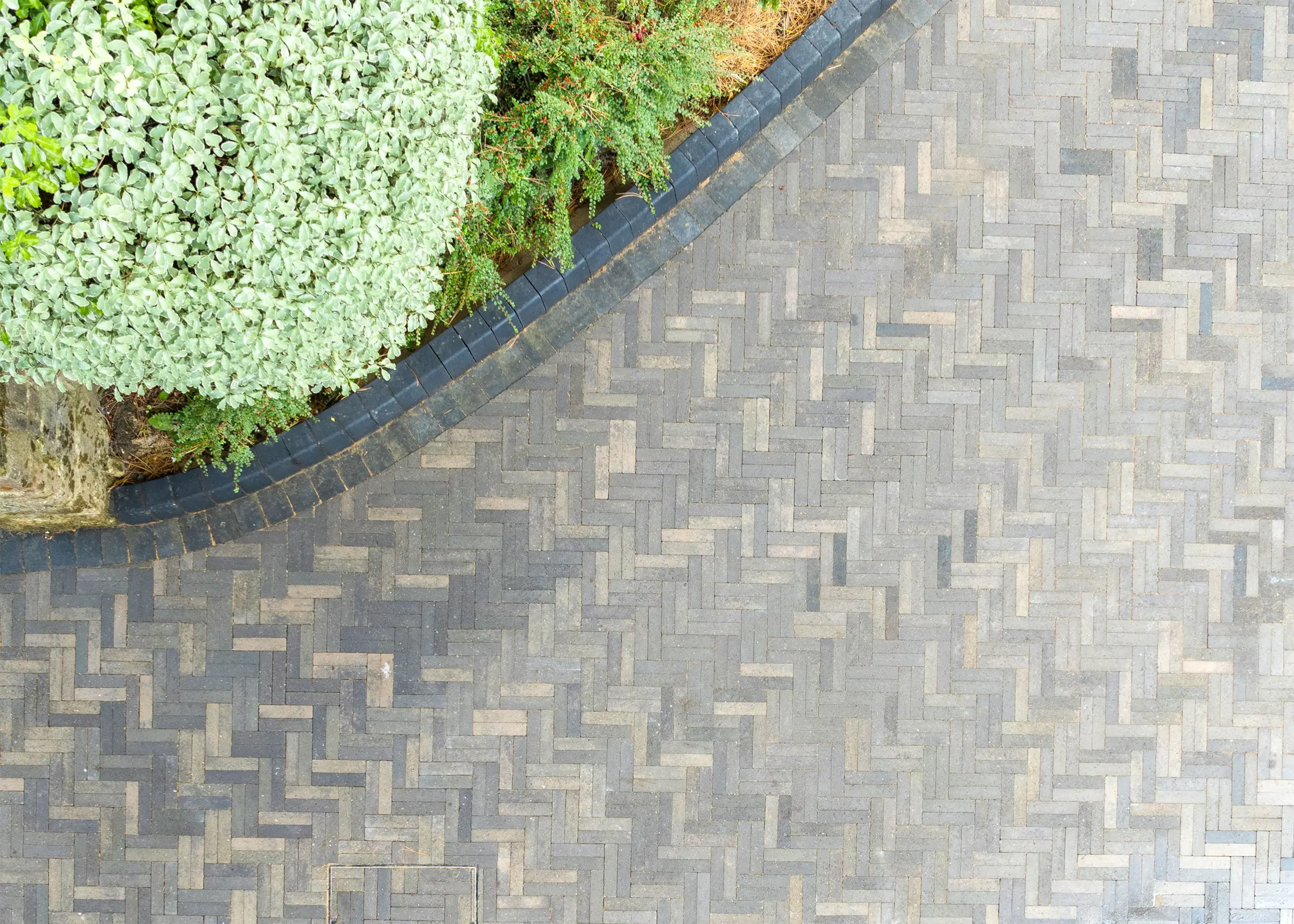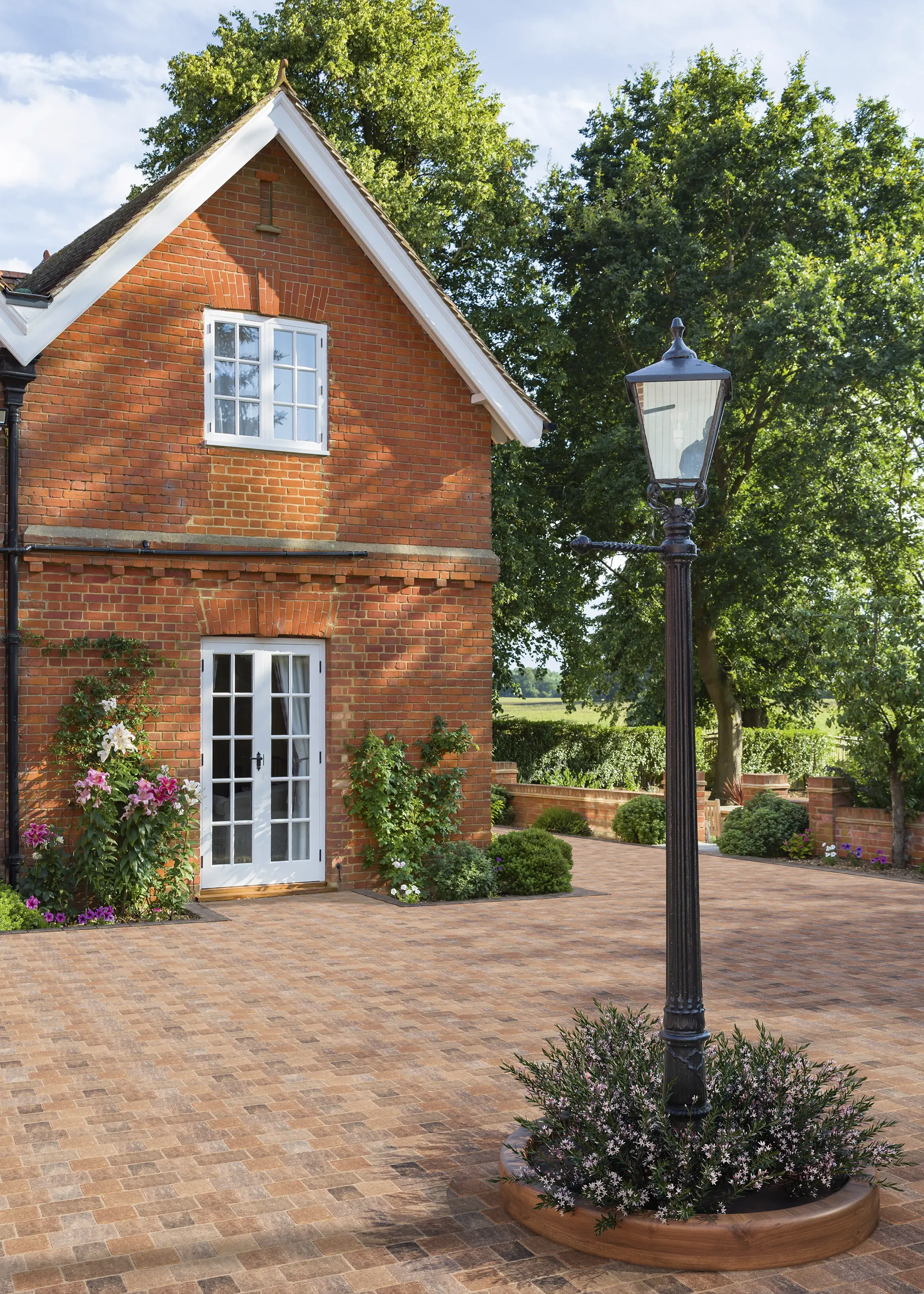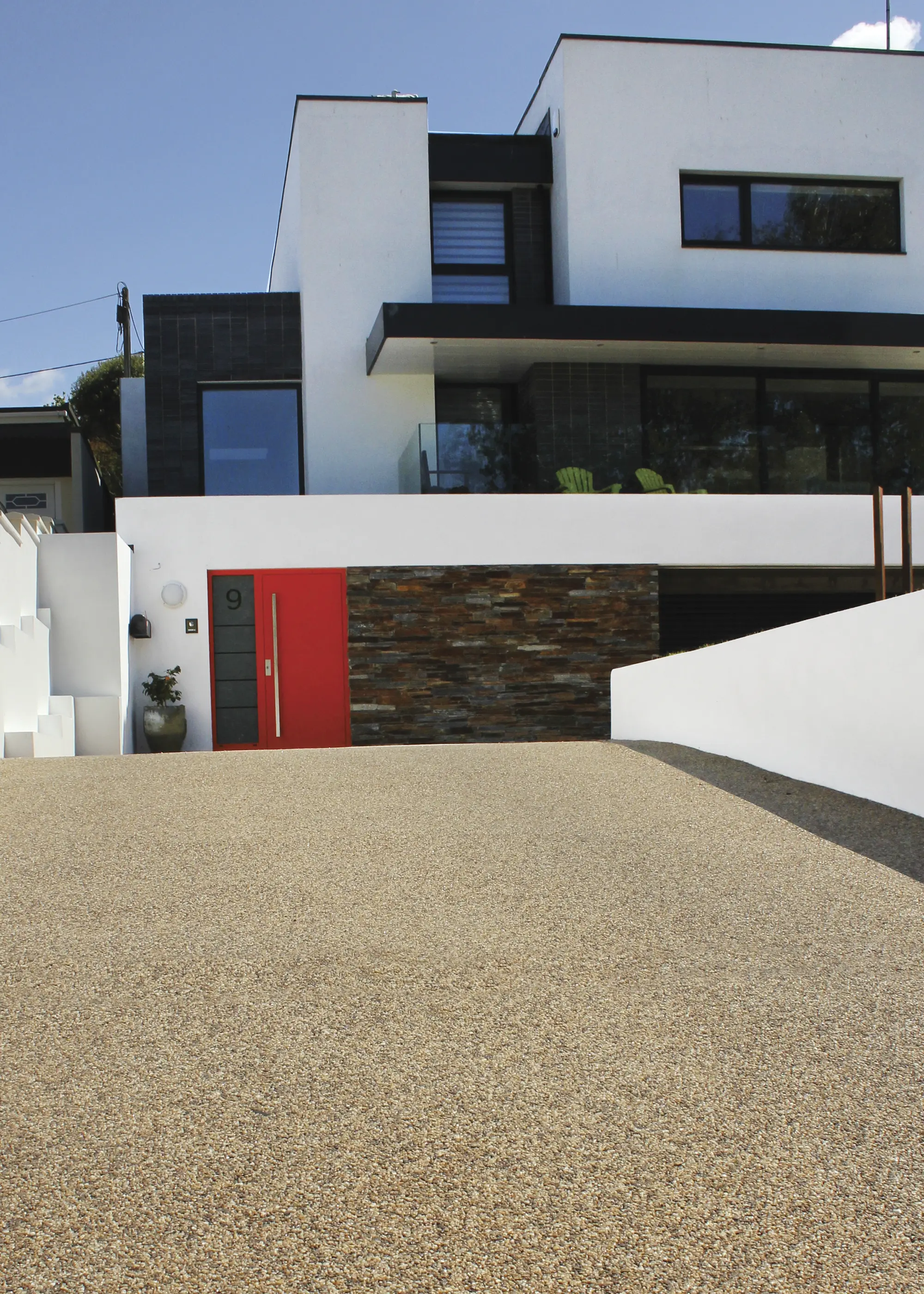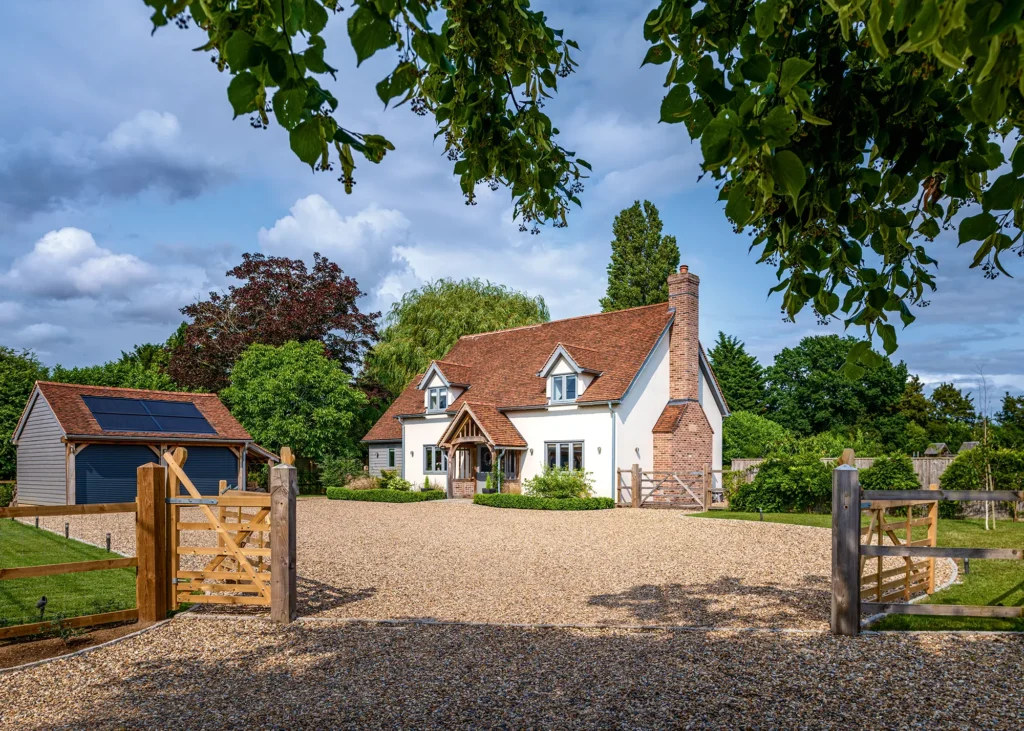
Early Bird Offer! Free tickets to meet independent experts at this summer's Build It Live
Save £24 - Book Now!
Early Bird Offer! Free tickets to meet independent experts at this summer's Build It Live
Save £24 - Book Now!Specifying the best driveway materials for your project will ensure enhanced kerb appeal and property value. Selecting the right surface material will not only complement your home’s aesthetics but will offer durability and functionality – so there’s plenty to consider and take into account when making a decision.
“A driveway isn’t just a place for parking the car, it’s a focal point for your home. Driveways occupy a prominent position in any property – usually in front of your house – so it’s often the first thing anyone sees,” says Viki Harris of Marshalls.
“A great driveway design ensures your property looks its best, maximises its kerb appeal and stands out. The most striking results make great use of the size, shape, and space available – and that means being robust, resilient and functional, as well looking good.”
With a plethora of driveway materials available, the decision-making process can be overwhelming – so what are the best options? And what should you consider in terms of driveway cost, maintenance and style? Here, we take a look at the characteristics of the different driveway surface options.
Block paving is a popular choice for those seeking attractive and affordable driveway materials. This style has a tessellating pattern, created by slotting identical stones together. This driveway material can create an extremely visually pleasing design that will give your home bags of character.
Even better, block paving complements a wide range of property types – from ultra-modern to cottage-style – as there are so many types of stone, brick and block available.

Piccolo Setts is a slimline concrete block paving driveway solution by Aggregate Industries is manufactured in the UK and produces around 50% less carbon compared to traditional clay pavers. The pavers are available in terracotta, sepia, smoke, and twilight to suit your exterior design
Pros: Block paving is known for its durability and ability to withstand heavy loads, making it a perfect driveway material that can stand up to parking cars for decades. Individual blocks allow for easy replacement, meaning driveway maintenance can be simple, too.
Benefits of block paving driveways: Some types of block paving are designed with permeable features, allowing water to drain through the surface of your driveway. This can help manage rainwater and reduce surface runoff. Also, block paving is flexible and can adapt to slight ground movements or settling. This flexibility helps prevent cracking or uneven surfaces. They’re most Ideal for driveways with high car traffic and external spaces prone to wet conditions.
Block paving driveway costsThere is huge variation here depending on the material. Prices for block paving driveways can range from £70-£120 per m² (installed). Concrete blocks are budget-friendly, while natural stone versions will be a more expensive option. |

Bradstone Woburn Rumbled block paving driveway offers a gorgeous weathered and mottled effect which has plenty of character
Tarmac is made using what most of us call macadam – broken stones of even size, bound with tar or bitumen. Tarmac offers a strong and even surface that is flat, smooth and resilient. It is a popular choice for homeowners building their driveway, as it offers a simple and clean finish – but this basic aesthetic means it is not the most beautiful to look at.
Pros: Tarmac will provide a comfortable and smooth drive with low-maintenance requirements. It is ideal for parking cars as it can withstand heavy weights, and offers some resistance to skidding.
Benefits of tarmac driveways: This is a flexible material, so it can adapt to different weather conditions, making it a sound driveway surface option in both hot temperatures and icy conditions. Tarmac is also recyclable – when it reaches the end of its lifespan, it can be recycled and reused in new asphalt projects. It’s best for self builders looking a for simple, cost-effective driveway material solution with a quick installation.
Tarmac driveway costsLook to budget approximately £45 per m² for a tarmac driveway, but allow for an additional £60 per m² for excavation during installation. |
TOP TIPS Using driveway materials to add interestWith their large swathes of uninterrupted hard surfaces, driveways can look bland if not enough thought goes into the overall design. Here’s how to create more kerb appeal:
|
Also known as pattern imprinted or stamped concrete driveways, this is a decorative driveway surface option that involves creating a textured or patterned surface on freshly poured concrete. It allows self builders or renovators to achieve the appearance of high-end paving materials, such as flagstones, while still benefiting from the durability and cost-effectiveness of concrete.
Pros: Unlike individual blocks or pavers that may sink over time, imprinted concrete maintains a smooth and even surface. This option is known for its durability and resistance to wear and tear.
Benefits of imprinted concrete driveways: There is flexibility in choice with this driveway material and you can achieve a wide range of patterns, textures, and colours, too. Because it is a solid surface, it minimises the spaces where weeds could grow, making imprinted concrete a low-maintenance driveway material. It’s best for anyone on a budget who wants to create an attractive pattern with a smooth surface.
Imprinted concrete driveway costsIncluding materials and labour, you should budget £60-£100 per m² for an imprinted concrete driveway. At the lower end of that scale, you’re looking at a basic product without complex patterns or additional features. |
CLOSER LOOK Designing a garageIncorporating your garage within (or alongside) your home gives easy access – useful if you want it to home tumble dryers, freezers and storage, not just the car – and will look streamlined and unfussy. If you build secure enough foundations it also gives you the option of converting it to living space later on. If you’re building a garage onto an existing property, it will be treated as an extension in terms of planning rules. A detached garage makes a style statement in its own right, and allows for a larger, multi-purpose structure to be built. “It is worth considering other uses for the garage at the design stage. Roof space can be put to good use as a teenagers’ retreat, guest room, games room or gym,” says James Scott of Scotts of Thrapston.
Many oak and timber frame companies also build garages, working on a modular system so you can create your ideal spec or offer bespoke solutions. To be classed as permitted development, structures should fall under a maximum roof height (4m for a dual pitched roof, 3m for any other roof – but 2.5m for any building sitting within 2m of the boundary). If your garage also includes living space, its purpose needs to be secondary – home offices and gyms are fine, but bedrooms will require formal consent. |
A resin bonded driveway is a surface that combines natural aggregates (such as gravel or stones) with a clear resin to create a visually appealing and durable finish. Homeowners can choose from various colours, sizes, and types of aggregates to achieve the desired driveway effect.
As with most driveway materials, proper installation is essential for the success of resin bonded driveways. This includes good base preparation, precise application of the resin, and even scattering of aggregates.

Oltco Recycle Bound is an innovative resin-bonded solution, made using waste plastic straws, drink bottles and food packaging. Each m2 consists of the equivalent of 3,000 plastic straws
Pros: Resin bonded driveways are known for their durability and ability to maintain a good-as-new aesthetic. The resin helps to bind the aggregates together, providing a robust surface, without loose gravel escaping. The bonded surface minimises weed growth, too.
Benefits of resin bonded driveways: The installation of resin bonded driveways is typically faster compared to some of the other popular options. Another benefit is that the resin cures quickly, allowing for a swift transformation. They’re sold as fully-permeable solutions that comply with Sustainable Urban Drainage System standards. It’s best for self builders looking for an attractive, easy-to-maintain finish with surface water drainage built-in.
Resin bonded driveway costsThe cost of resin bonded driveways can vary based on factors such as the type of aggregates used, the size of the area, and the complexity of the design. Budget for around £100-£150 per m² for a resin bonded driveway. |
Gravel driveways are popular for their natural appearance, cost-effectiveness, and relatively simple installation – plus the pleasing sound of the crunch when driven on! They consist of loose aggregates, which can include various types of stones, rocks, or fragments, which are spread and compacted to create a stable surface.

With the help of Welsh Oak Frame, Matt and Sarah Switzer self built their dream 1.5 storey oak home in the essex countryside. The gravel driveway suits the cottage-style home perfectly while adding a level of security with its crunch sound when driven on. Photo: Nikhilesh Haval
Pros: Gravel driveways provide a natural and rustic appearance that can complement a range of architectural styles, from traditional to contemporary. This is a budget-friendly option with various natural stone shades available.
Benefits of gravel driveways: Gravel is a permeable material, allowing water to pass through and reducing surface runoff. This can be beneficial for managing rainwater and preventing puddles. The installation process for gravel driveways is generally simpler compared to more complex driveway materials. It involves preparing the base, spreading the gravel, and compacting it. This driveway material is best for those seeking a cost-effective solution with a natural and characterful feel.
Gravel driveway costsThe base price for a basic gravel driveway, with standard gravel and minimal site preparation, starts from around £15 per m². This can go up to more like £40 per m² for more complex projects. |
Main image: Words by Emily Brooks & Anna-Marie DeSouza.
Comments are closed.